On August 2, 2017, Vanda Felbab-Brown submitted a statement for the record for the House Foreign Affairs Committee on the human rights consequences of the war on drugs in the Philippines. Read her full statement below.
I am a Senior Fellow at The Brookings Institution. However, as an independent think tank, the Brookings Institution does not take institutional positions on any issue. Therefore, my testimony represents my personal views and does not reflect the views of Brookings, its other scholars, employees, officers, and/or trustees.
President Rodrigo Duterte’s war on drugs in the Philippines is morally and legally unjustifiable. Resulting in egregious and large-scale violations of human rights, it amounts to state-sanctioned murder. It is also counterproductive for countering the threats and harms that the illegal drug trade and use pose to society — exacerbating both problems while profoundly shredding the social fabric and rule of law in the Philippines. The United States and the international community must condemn and sanction the government of the Philippines for its conduct of the war on drugs.
THE SLAUGHTER SO FAR
On September 2, 2016 after a bomb went off in Davao where Duterte had been mayor for 22 years, the Philippine president declared a “state of lawlessness”1 in the country. That is indeed what he unleashed in the name of fighting crime and drugs since he became the country’s president on June 30, 2016. With his explicit calls for police to kill drug users and dealers2 and the vigilante purges Duterte ordered of neighborhoods,3 almost 9000 people accused of drug dealing or drug use were killed in the Philippines in the first year of his government – about one third by police in anti-drug operations.4 Although portrayed as self-defense shootings, these acknowledged police killings are widely believed to be planned and staged, with security cameras and street lights unplugged, and drugs and guns planted on the victim after the shooting.5 According to the interviews and an unpublished report an intelligence officer shared with Reuters, the police are paid about 10,000 pesos ($200) for each killing of a drug suspect as well as other accused criminals. The monetary awards for each killing are alleged to rise to 20,000 pesos ($400) for a street pusher, 50,000 pesos ($990) for a member of a neighborhood council, one million pesos ($20,000) for distributors, retailers, and wholesalers, and five million ($100,000) for “drug lords.” Under pressure from higher-up authorities and top officials, local police officers and members of neighborhood councils draw up lists of drug suspects. Lacking any kind transparency, accountability, and vetting, these so-called “watch lists” end up as de facto hit lists. A Reuters investigation revealed that police officers were killing some 97 percent of drug suspects during police raids,6 an extraordinarily high number and one that many times surpasses accountable police practices. That is hardly surprising, as police officers are not paid any cash rewards for merely arresting suspects. Both police officers and members of neighborhood councils are afraid not to participate in the killing policies, fearing that if they fail to comply they will be put on the kill lists themselves.
Similarly, there is widespread suspicion among human rights groups and monitors,7 reported in regularly in the international press, that the police back and encourage the other extrajudicial killings — with police officers paying assassins or posing as vigilante groups.8 A Reuters interview with a retired Filipino police intelligence officer and another active-duty police commander reported both officers describing in granular detail how under instructions from top-level authorities and local commanders, police units mastermind the killings.9 No systematic investigations and prosecutions of these murders have taken place, with top police officials suggesting that they are killings among drug dealers themselves.10
Such illegal vigilante justice, with some 1,400 extrajudicial killings,11 was also the hallmark of Duterte’s tenure as Davao’s mayor, earning him the nickname Duterte Harry. And yet, far from being an exemplar of public safety and crime-free city, Davao remains the murder capital of the Philippines.12 The current police chief of the Philippine National Police Ronald Dela Rosa and President Duterte’s principal executor of the war on drugs previously served as the police chief in Davao between 2010 and 2016 when Duterte was the town’s mayor.
In addition to the killings, mass incarceration of alleged drug users is also under way in the Philippines. The government claims that more than a million users and street-level dealers have voluntarily “surrendered” to the police. Many do so out of fear of being killed otherwise. However, in interviews with Reuters, a Philippine police commander alleged that the police are given quotas of “surrenders,” filling them by arresting anyone on trivial violations (such as being shirtless or drunk).13 Once again, the rule of law is fundamentally perverted to serve a deeply misguided and reprehensible state policy.
SMART DESIGN OF DRUG POLICIES VERSUS THE PHILIPPINES REALITY
Smart policies for addressing drug retail markets look very different than the violence and state-sponsored crime President Duterte has thrust upon the Philippines. Rather than state-sanctioned extrajudicial killings and mass incarceration, policing retail markets should have several objectives: The first, and most important, is to make drug retail markets as non-violent as possible. Duterte’s policy does just the opposite: in slaughtering people, it is making a drug-distribution market that was initially rather peaceful (certainly compared to Latin America,14 such as in Brazil15) very violent – this largely the result of the state actions, extrajudicial killings, and vigilante killings he has ordered. Worse yet, the police and extrajudicial killings hide other murders, as neighbors and neighborhood committees put on the list of drug suspects their rivals and people whose land or property they want to steal; thus, anyone can be killed by anyone and then labeled a pusher.
The unaccountable en masse prosecution of anyone accused of drug trade involvement or drug use also serves as a mechanism to squash political pluralism and eliminate political opposition. Those who dare challenge President Duterte and his reprehensible policies are accused of drug trafficking charges and arrested themselves. The most prominent case is that of Senator Leila de Lima. But it includes many other lower-level politicians. Without disclosing credible evidence or convening a fair trial, President Duterte has ordered the arrest of scores of politicians accused of drug-trade links; three such accused mayors have died during police arrests, often with many other individuals dying in the shoot-outs. The latest such incident occurred on July 30, 2017 when Reynaldo Parojinog, mayor of Ozamiz in the southern Philippines, was killed during a police raid on his house, along with Parojinog’s wife and at least five other people.
Another crucial goal of drug policy should be to enhance public health and limit the spread of diseases linked to drug use. The worst possible policy is to push addicts into the shadows, ostracize them, and increase the chance of overdoses as well as a rapid spread of HIV/AIDS, drug-resistant tuberculosis, and hepatitis. In prisons, users will not get adequate treatment for either their addiction or their communicable disease. That is the reason why other countries that initially adopted similar draconian wars on drugs (such as Thailand in 200116 and Vietnam in the same decade17) eventually tried to backpedal from them, despite the initial popularity of such policies with publics in East Asia. Even though throughout East Asia, tough drug policies toward drug use and the illegal drug trade remain government default policies and often receive widespread support, countries, such as Thailand, Vietnam, and even Myanmar have gradually begun to experiment with or are exploring HARM reduction approaches, such as safe needle exchange programs and methadone maintenance, as the ineffective and counterproductive nature and human rights costs of the harsh war on drugs campaign become evident.
Moreover, frightening and stigmatizing drug users and pushing use deeper underground will only exacerbate the spread of infectious diseases, such as HIV/AIDS, hepatitis, and tuberculosis. Even prior to the Duterte’s brutal war on drugs, the rate of HIV infections in the Philippines has been soaring due to inadequate awareness and failure to support safe sex practices, such as access to condoms. Along with Afghanistan, the Philippine HIV infection rate is the highest in Asia, increasing 50 percent between 2010 and 2015.18Among high-risk groups, including injection- drug users, gay men, transgender women, and female prostitutes, the rate of new infections jumped by 230 percent between 2011and 2015. Duterte’s war on drugs will only intensify these worrisome trends among drug users.
Further, as Central America has painfully learned in its struggles against street gangs, mass incarceration policies turn prisons into recruiting grounds for organized crime. Given persisting jihadi terrorism in the Philippines, mass imprisonment of low-level dealers and drug traffickers which mix them with terrorists in prisons can result in the establishment of dangerous alliances between terrorists and criminals, as has happened in Indonesia.
The mass killings and imprisonment in the Philippines will not dry up demand for drugs: the many people who will end up in overcrowded prisons and poorly-designed treatment centers (as is already happening) will likely remain addicted to drugs, or become addicts. There is always drug smuggling into prisons and many prisons are major drug distribution and consumption spots.
Even when those who surrendered are placed into so-called treatment centers, instead of outright prisons, large problems remain. Many who surrendered do not necessarily have a drug abuse problem as they surrendered preemptively to avoid being killed if they for whatever reason ended up on the watch list. Those who do have a drug addiction problem mostly do not receive adequate care. Treatment for drug addiction is highly underdeveloped and underprovided in the Philippines, and China’s rushing in to build larger treatment facilities is unlikely to resolve this problem. In China itself, many so-called treatment centers often amounted to de facto prisons or force-labor detention centers, with highly questionable methods of treatment and very high relapse rates.
As long as there is demand, supply and retailing will persist, simply taking another form. Indeed, there is a high chance that Duterte’s hunting down of low-level pushers (and those accused of being pushers) will significantly increase organized crime in the Philippines and intensify corruption. The dealers and traffickers who will remain on the streets will only be those who can either violently oppose law enforcement and vigilante groups or bribe their way to the highest positions of power. By eliminating low-level, mostly non-violent dealers, Duterte is paradoxically and counterproductively setting up a situation where more organized and powerful drug traffickers and distribution will emerge.
Inducing police to engage in de facto shoot-to-kill policies is enormously corrosive of law enforcement, not to mention the rule of law. There is a high chance that the policy will more than ever institutionalize top-level corruption, as only powerful drug traffickers will be able to bribe their way into upper-levels of the Philippine law enforcement system, and the government will stay in business. Moreover, corrupt top-level cops and government officials tasked with such witch-hunts will have the perfect opportunity to direct law enforcement against their drug business rivals as well as political enemies, and themselves become the top drug capos. Unaccountable police officers officially induced to engage in extrajudicial killings easily succumb to engaging in all kinds of criminality, being uniquely privileged to take over criminal markets. Those who should protect public safety and the rule of law themselves become criminals.
Such corrosion of the law enforcement agencies is well under way in the Philippines as a result of President Duterte’s war on drugs. Corruption and the lack of accountability in the Philippine police l preceded Duterte’s presidency, but have become exacerbated since, with the war on drugs blatant violations of rule of law and basic legal and human rights principles a direct driver. The issue surfaced visibly and in a way that the government of the Philippines could not simply ignore in January 2017 when Philippine drug squad police officers kidnapped a South Korean businessman Jee Ick-joo and extorted his family for money. Jee was ultimately killed inside the police headquarters. President Duterte expressed outrage and for a month suspended the national police from participating in the war on drugs while some police purges took places. Rather than a serious effort to root out corruption, those purges served principally to tighten control over the police. The wrong-headed illegal policies of Duterte’s war on drugs were not examined or corrected. Nor were other accountability and rule of law practices reinforced. Thus when after a month the national police were was asked to resume their role in the war on the drugs, the perverted system slid back into the same human rights violations and other highly detrimental processes and outcomes.
WHAT COUNTERNARCOTICS POLICIES THE PHILIPPINES SHOULD ADOPT
The Philippines should adopt radically different approaches: The shoot-to-kill directives to police and calls for extrajudicial killings should stop immediately, as should dragnets against low-level pushers and users. If such orders are issued, prosecutions of any new extrajudicial killings and investigations of encounter killings must follow. In the short term, the existence of pervasive culpability may prevent the adoption of any policy that would seek to investigate and prosecute police and government officials and members of neighborhood councils who have been involved in the state-sanctioned slaughter. If political leadership in the Philippines changes, however, standing up a truth commission will be paramount. In the meantime, however, all existing arrested drug suspects need to be given fair trials or released.
Law-enforcement and rule of law components of drug policy designs need to make reducing criminal violence and violent militancy among their highest objectives. The Philippines should build up real intelligence on the drug trafficking networks that President Duterte alleges exist in the Philippines and target their middle operational layers, rather than low-level dealers, as well as their corruption networks in the government and law enforcement. However, the latter must not be used to cover up eliminating rival politicians and independent political voices.
To deal with addiction, the Philippines should adopt enlightened harm-reduction measures, including methadone maintenance, safe-needle exchange, and access to effective treatment. No doubt, these are difficult and elusive for methamphetamines, the drug of choice in the Philippines. Meth addiction is very difficult to treat and is associated with high morbidity levels. Instead of turning his country into a lawless Wild East, President Duterte should make the Philippines the center of collaborative East Asian research on how to develop effective public health approaches to methamphetamine addiction.
IMPLICATIONS FOR U.S. POLICY
It is imperative that the United States strongly and unequivocally condemns the war on drugs in the Philippines and deploys sanctions until state-sanctioned extrajudicial killings and other state-authorized rule of law violations are ended. The United States should adopt such a position even if President Duterte again threatens the U.S.-Philippines naval bases agreements meant to provide the Philippines and other countries with protection against China’s aggressive moves in the South China Sea. President Duterte’s pro-China preferences will not be moderated by the United States being cowed into condoning egregious violations of human rights. In fact, a healthy U.S.-Philippine long-term relationship will be undermined by U.S. silence on state-sanctioned murder.
However, the United States must recognize that drug use in the Philippines and East Asia more broadly constitute serious threats to society. Although internationally condemned for the war on drugs, President Duterte remains highly popular in the Philippines, with 80 percent of Filipinos still expressing “much trust” for him after a year of his war on drugs and 9,000 people dead.19 Unlike in Latin America, throughout East Asia, drug use is highly disapproved of, with little empathy for users and only very weak support for drug policy reform. Throughout the region, as well as in the Philippines, tough-on-drugs approaches, despite their ineffective outcomes and human rights violations, often remain popular. Fostering an honest and complete public discussion about the pros and cons of various drug policy approaches is a necessary element in creating public demand for accountability of drug policy in the Philippines.
Equally important is to develop better public health approaches to dealing with methamphetamine addiction. It is devastating throughout East Asia as well as in the United States, though opiate abuse mortality rates now eclipse methamphetamine drug abuse problems. Meth addiction is very hard to treat and often results in severe morbidity. Yet harm reduction approaches have been predominately geared toward opiate and heroin addictions, with substitution treatments, such as methadone, not easily available for meth and other harm reduction approaches also not directly applicable.
What has been happening in the Philippines is tragic and unconscionable. But if the United States can at least take a leading role in developing harm reduction and effective treatment approaches toward methamphetamine abuse, its condemnation of unjustifiable and reprehensible policies, such as President Duterte’s war on drugs in the Philippines, will far more soundly resonate in East Asia, better stimulating local publics to demand accountability and respect for rule of law from their leaders.
-
Footnotes
- Neil Jerome Morales, “Philippines Blames IS-linked Abu Sayyaf for Bomb in Duterte’s Davao,” Reuters, September 2, 2016, http://www.reuters.com/article/us-philippines-blast-idUSKCN11824W?il=0.
- Rishi Iyengar, “The Killing Time: Inside Philippine President Rodrigo Duterte’s War on Drugs,” Time, August 24, 2016, http://time.com/4462352/rodrigo-duterte-drug-war-drugs-philippines-killing/.
- Jim Gomez, “Philippine President-Elect Urges Public to Kill Drug Dealers,” The Associated Press, June 5, 2016, http://bigstory.ap.org/article/58fc2315d488426ca2512fc9fc8d6427/philippine-president-elect-urges-public-kill-drug-dealers.
- Manuel Mogato and Clare Baldwin, “Special Report: Police Describe Kill Rewards, Staged Crime Scenes in Duterte’s Drug War,” Reuters, April 18, 2017, http://www.reuters.com/article/us-philippines-duterte-police-specialrep-idUSKBN17K1F4.
- Ibid.
- Clare Baldwin, Andrew R.C. Marshall and Damir Sagolj, “Police Rack Up an Almost Perfectly Deadly Record in Philippine Drug War,” Reuters, http://www.reuters.com/investigates/special-report/philippines-duterte-police/.
- See, for example, Human Rights Watch, “Philippines: Police Deceit in ‘Drug War’ Killings,” March 2, 2017, https://www.hrw.org/news/2017/03/02/philippines-police-deceit-drug-war-killings; and Amnesty International, “Philippines: The Police’s Murderous War on the Poor,” https://www.amnesty.org/en/latest/news/2017/01/philippines-the-police-murderous-war-on-the-poor/.
- Reuters, April 18, 2017.
- Ibid.
- Aurora Almendral, “The General Running Duterte’s Antidrug War,” The New York Times, June 2, 2017.
- Ibid.
- “A Harvest of Lead,” The Economist, August 13, 2016, http://www.economist.com/news/leaders/21704793-rodrigo-duterte-living-up-his-promise-fight-crime-shooting-first-and-asking-questions.
- Reuters, April 18, 2017.
- Vanda Felbab-Brown and Harold Trinkunas, “UNGASS 2016 in Comparative Perspective: Improving the Prospects for Success,” The Brookings Institution, April 29, 2015, https://www.brookings.edu/~/media/Research/Files/Papers/2015/04/global-drug-policy/FelbabBrown-TrinkunasUNGASS-2016-final-2.pdf?la=en.
- See, for example, Paula Miraglia, “Drugs and Drug Trafficking in Brazil: Trends and Policies,” The Brookings Institution, April 29, 2015, https://www.brookings.edu/~/media/Research/Files/Papers/2015/04/global-drug-policy/Miraglia–Brazil-final.pdf?la=en.
- James Windle, “Drugs and Drug Policy in Thailand,” Improving Global Drug Policy: Comparative Perspectives and UNGASS 2016, The Brookings Institution, April 2015, https://www.brookings.edu/~/media/Research/Files/Papers/2015/04/global-drug-policy/WindleThailand-final.pdf?la=en.
- James Windle, “Drugs and Drug Policy in Vietnam,” Improving Global Drug Policy: Comparative Perspectives and UNGASS 2016, The Brookings Institution, April 2015, https://www.brookings.edu/wp-content/uploads/2016/07/WindleVietnam-final.pdf.
- Aurora Almendral, “As H.I.V. Soars in the Philippines, Conservatives Kill School Condom Plan,” The New York Times, February 28, 2017, https://www.nytimes.com/2017/02/28/world/asia/as-hiv-soars-in-philippines-conservatives-kill-school-condom-plan.html?_r=0.
- Nicole Curato, “In the Philippines, All the President’s People,” The New York Times, May 31, 2017, https://www.nytimes.com/2017/05/31/opinion/philippines-rodrigo-duterte.html.
The Brookings Institution is committed to quality, independence, and impact.
We are supported by a diverse array of funders. In line with our values and policies, each Brookings publication represents the sole views of its author(s).
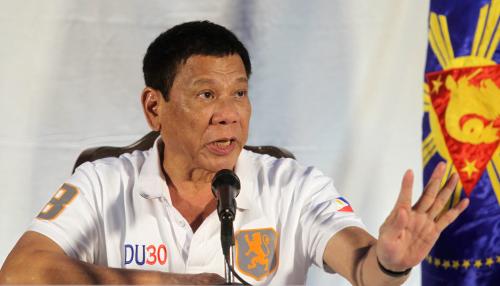
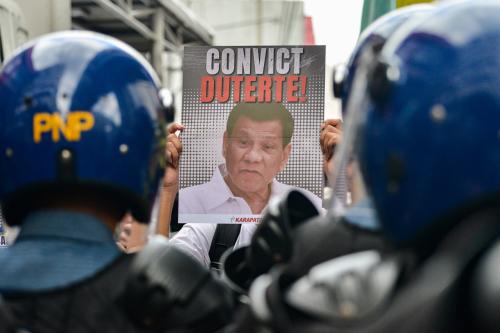
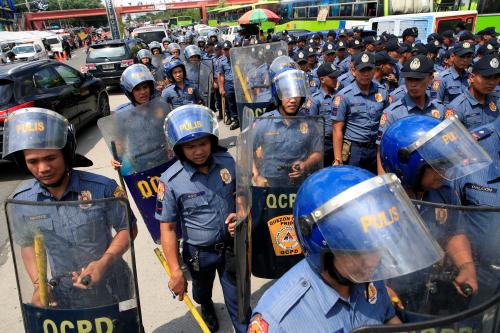
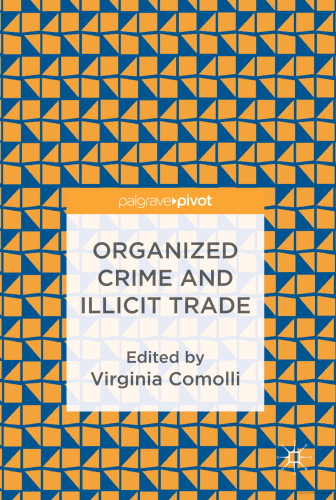
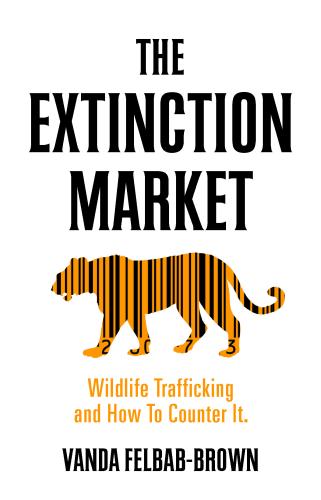
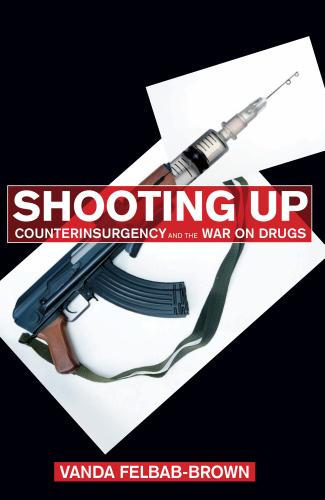

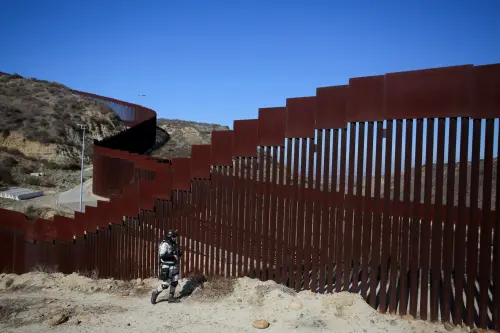
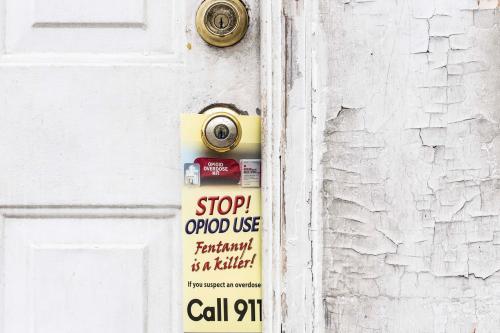

Commentary
TestimonyThe human rights consequences of the war on drugs in the Philippines
August 8, 2017